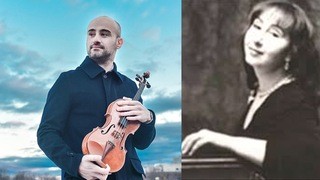|
Back
Schubert in the Key of “Whew” New York
BargeMusic
12/03/2021 -
Robert Schumann: Fantasie in C Major for Violin and Piano, Opus 131
Henryk Wieniawski: Fantasy on Themes of Gounod’s “Faust”, Opus 20
Franz Schubert: Fantasy in C Major, D. 934
Igor Pikayzen (Violin), Tatyana Pikayzen (Piano)

I. Pikayzen, T. Pikayzen (© Courtesy of the Artists)
“Her ivory hands on the ivory keys/Strayed in a fitful fantasy.”
Oscar Wilde, (1854-1900), In the Gold Room
“‘Fantasy’: From (late Greek) ‘phainesthai’: to appear; related to ‘phaos, phos’: light; from ‘phainein’: to bring to light.”
Dictionary of Etymology
The trio of “fantasies” last night at BargeMusic weren’t quite as fantastic as their titles promised. Though this was hardly the fault of fiddler Igor Pikayzen or pianist Tatyana Pikayzen.
The first fantasy was a moderately interesting surprise. The second was an understatement. And only the third fantasy was equal to the title. Lyrical, surprising, incredibly difficult. And as far as the etymology above, it did “bring to light” a beautiful (if mawkish) song.
As for the performers, both mother and son were more than adequate. Neither is quite a household name. But to pianists, the Russian-trained Tatyana Pikayzen has been labeled “the Paganini of the Keyboard”. As a soloist, she has performed and recorded internationally, teaches at numerous conservatory.
Here, as an accompanist, her balance with violin, in the challenging BargeMusic venue, and her amazing virtuosity in Schubert’s Fantasy were devilishly great.
Igor has had an equally masterful resume, numerous awards and heads a summer festival around his Connecticut home.
Last night, my initial thoughts were underwhelming. Perhaps one was expecting lush Russian-style singing tones from his instrument. Instead, Mr. Pikayzen produced an unexpectedly lean tone. This was not a “concerto” tone to vie with an orchestra, but a more restrained voice. That was for the opening Schumann Fantasie. As the hour-long recital went on, one realized that such moderation gave room for excelling fingering in even the most difficult passages.
Mind you, Mr. Plekyanov never came close to the unassuming glory of, say, a Joshua Bell. The glory here was never shouted out to the audience: rather, one had to make a mutual effort with the artist, to get the most out of it.
Incidentally, one might have been jolted to hear about a Schumann violin piece, an opus 131 written during the composer’s “loony-bin” years. His compositions then – even his rarely played Beethoven Seventh Symphony variations – lacked the oomph, the delicious invention of his young years.
That was true with this Fantasie for Violin and Piano. I had never previously heard it, for good reason. It was composed for a virtuoso (Joachim), and achieved a certain initial fame, both for piano and later orchestration. Here, both Pikayzens played with suitable artistry, and the short cadenza was handled with enough flair. And while probably caviar for the violinist, these ears were hardly satisfied. Yet inspiration was precluded by craftsmanship.
The following Wienawski “Gounod” Fantasy was equally unexpected, though not in a bad way. Like so many of the violin/composers in the 19th Century, their violins were instruments to demonstrate digital miracles. Wienawski was no exception. But when he heard Gounod’s Faust–a very pretty opera albeit one which would have horrified Goethe–he was struck by the melodies.
Thus this Fantasy was more a reprise of the opera (what we now call a “cover version”) than an exhibitionist showpiece. Not that Mr. Pikayzen could zoom through it. While this was a summary of melodies (albeit Wienawski’s exclusion of “The Jewel Song”), it lacked no end of arpeggios, double-bowings, pizzicati and notes on he top end of the register, and both violinist and pianist sailed through.
The epiphany of the evening, performed with both grace and epic finger work, was Schubert’s Fantasy. The least important part, for this listener, was a technique which presaged Paganini. Double-stopping, harmonics, incredile staccato in the rapid tempos (yet played with utmost tranquility)...This was par for the course.
>BR />
Far more splendid was the music itself, beginning with mysterious chords, going onto variations on a sentimental Schubert song, as Tatyana Pikayzen showed her chops for the third variation. Yet each measure of this middle section became increasingly intense, fiery, strange, a Beethoven anthem, machinations on the E string.
This, in my score, is a mere Andantino. The last movement is Allegro Presto. Or, in more technical terms, Whew!.
Yet the Pikayzens never stopped. The difficulties were manifold–but Schubert never failed in lyricism, in melody, and in delight, sheer delight, for both listeners and artists.
Harry Rolnick
|